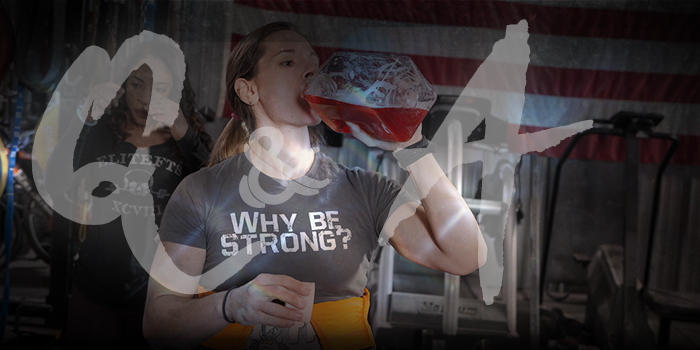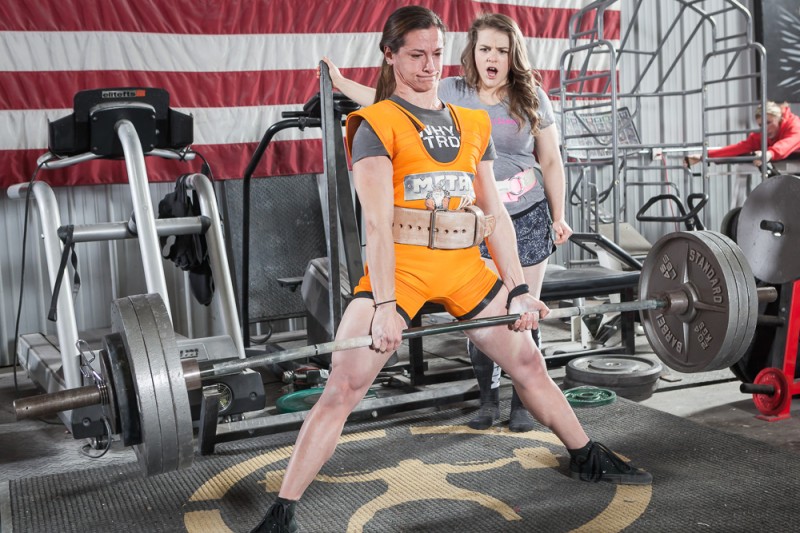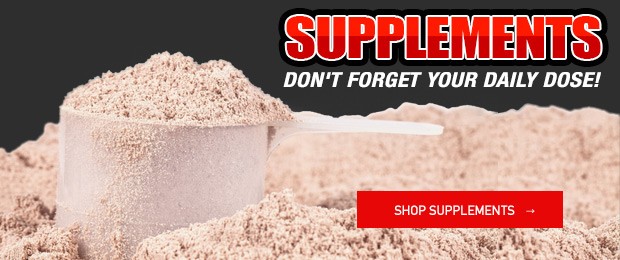
You have questions, team elitefts has answers. This article is a compilation of nutrition questions asked by you, our readers, directly to members of team elitefts. In the last two months, we have covered squat, deadlift, and bench press topics, and are now turning to a specific subset of nutrition: intra-workout supplementation.
In this article, Brandon Smitley, Skip Hill, Clint Darden, Vincent Dizenzo, and Mark Dugdale, answer questions about how to economically use supplements while on a budget, how to use HBCD for improving body composition, fasting, and the importance of nutrient timing.
Supplements on a Budget
Q: I'm on a fair budget and have a question about intra-workout nutrition.
I'm currently taking 5g Glutamine and 5g BCAA's intra-workout but I feel like I could be getting more out of it after reading Mark Dugdale's recent article on his daily diet.
Any recommendations for a (temporarily) broke bodybuilder? — JAMES
Brandon Smitley:
Creatine would be a good one, as it's super cheap. Then a quick digesting carb. Obviously it would be nice to get some highly branched cyclic dextrin, but if you are on a budget, just a simple carb powder or Gatorade would be better than nothing.
Skip Hill:
Honestly, I really think that different intra carb sources are overrated. From the old Vitargo to dextrose to sugar-based Gatorade, I would be shocked if you would ever see or know the difference in your progress.
Instantized BCAAs are cheap in powder form. I am a sponsored athlete and get all of my supplements free every month—whatever I want—and I still only use one thing in my intra: BCAA powder. No glutamine, creatine, NO2, etc.. Think about it for a minute: If I thought there was ANY benefit to putting something else in my intra, I most certainly would, considering it is all free to me.
Clint Darden:
If you want to go cheap: Drink a 15g protein shake on the way to the gym. Drink another 10-15g mid-session. Another immediately after. That is a total of two scoops.
Gatorade is cheap but it is not as cheap as most dextrose/maltodextrin mixes. I can buy enough to last me a month for about $15 and every night before bed I will take an empty 1.5 liter bottle and add dex/malto to it so that it contains around 150g carbs. I can drink this during the day or during training.
BCAA's are great but they are already in your protein powder. If you are on a budget it is the cheapest place to get most of what you need.
HBCD for Improving Body Composition
Q: How do I utilize HBCD carbs in my training when I am trying to lose fat/recomp? I am diligently working to improve my diet and body composition. I am 41 years old, 264 pounds, six-feet tall, and around 29% bodyfat.
I have found over the years of yo-yo diets that I do better with lower carb/higher protein and have finally established better habits with drastically lowering sugar and empty calories. I have recently started a denser training program that keeps me moving between heavy sets of triples in compound movements with short rest periods two days a week, added circuit style training one day a week, and LSD/HR work two days a week. I am trying to dial in a carb/calorie cycling method for the days I train heavy and thought that highly branched cyclic dextrin would help me on the days I am going heavy and hard to get through the specific period of effort, as they are fast acting. Do they essentially work as quick energy or work more as a shuttle for protein and other nutrients to mix with them or both? Any advice would be appreciated. — JEFF
Brandon Smitley:
Awesome question. HBCD is a really cool carbohydrate source. The gist of it is that it has a fast gastric emptying rate, but without a huge blood sugar spike. What this means is that it moves through the GI at the rate of a carbohydrate like sugar, but impacts blood glucose similar to brown rice for example. You get both benefits without the upset stomach or the feeling that you're going to pass out from your blood sugar levels spiking and dropping quickly.
If you are trying to decrease your body fat percentage, I would still suggest having some HBCD in your diet. Look at it this way: it's going to help provide you some fuel to get through those tough training sessions, something that will be hard to do when in caloric deficit and lower carb intakes. I would just not go overboard on them. Merely a 25-30 gram serving for a session should be plenty. On your LISS days, you certainly won't need any.
Vincent Dizenzo:
Brandon gave a great answer to your question. Now I'm going to share my not-very-nutritionally-educated opinion: If you are 29% body fat, HBCD should be very low on your list of worries. If you need to drop body fat, you will need to be in a calorie deficit. I know being in a calorie deficit makes me hangry, hence why I don't drink my carbs EVER, even on my high day of 650. I'd rather have things like instant oatmeal, bananas, etc. to fuel my training.
Fasting and HBCD
Q: Do you need to have an empty stomach for HBCD to be effective in your intra-workout drink? — MATT
Mark Dugdale:
I can only speak from personal experience and my preference is to take HBCD on an empty stomach. In fact, that's one of the reasons I train first thing in the morning. I wake up, start drinking Plazma, and hit the gym within 30 minutes.
Brandon Smitley
I can't speak if you NEED to have an empty stomach, but I usually have half a scoop of whey isolate protein about 45 minutes out from training. Then I start sipping the HBCD upon my warm-up sets. It's worked pretty well for me, but you may need to experiment and see what works best for you.
Nutrient Timing
Q: I am a 28-year-old male starting my plan to get back to 10 percent bodyfat from 17. I've been doing some reading and have a few questions. Do I need to worry much about nutrient timing and intra workout supplements? Too much reading has left me confused. It is my first time constructing an eating plan to lose body fat and I'm a tad lost. — Kane
Brandon Smitley:
This is a great question. I recommend that you first focus on calories and macronutrients. Find a way to track what you are currently eating and begin to make adjustments to that to get you to your end goal. Focus on the big hitters and then place the macronutrients based upon how you like to train and when. Some people respond better with higher carbs/lower fat and vice versa. You don't NEED to have all the fancy stuff under the sun supplement-wise to make this happen. Now, if you are wanting to spruce it up and you have the disposable income to do so, it can certainly help, but the bread and butter (maybe that's a bad analogy here) needs to be around solid food choices, calories, and your macronutrients.
Vincent Dizenzo:
Brandon gave you perfect advice. I know I used to worry so much about nutrient timing, meanwhile the rest of my day was less thought out. Yep, that's the complete opposite of how it should be. Nailing the macros correctly for the day is the biggest part of the equation. You could say it's around 95%. Dialing in nutrient timing could give you that additional 5%.
My advice regarding cheat meals is that if have not earned it, you should not have it. So, if you are perfect with diet and are dropping the pounds then you have earned a cheat meal. If not, don't. Also, I treat them like deloads, I don't always take them if I don't feel I need it.
Good luck getting down to 10%. That's a great goal.










